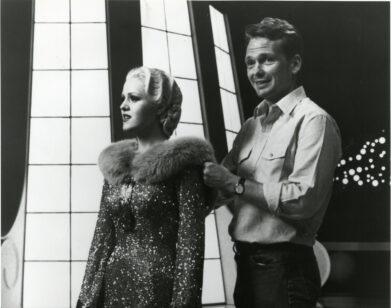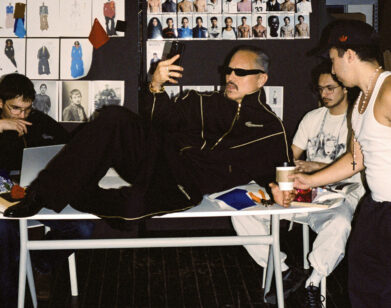Tavi Gevinson and Natasha Stagg On Instagram, Incels, and Lana Del Rey

Natasha Stagg. Photo by Roeg Cohen.
From Jia Tolentino to Amanda Hess, millennial women who understand social media—and thus the cynicism and thrill of myth-building, the big business of serotonin addiction, the cringeworthy transparency of crowdsourcing vanity needs—are the most important writers of our generation. Among this esteemed group of writers, Natasha Stagg, a novelist, essayist, and Internet scholar par excellence, stands out.
Her debut novel, Surveys (2016), was a particularly clairvoyant window into Instagram fame and the rise of the influencer. With Sleeveless: Fashion, Image, Media, New York 2011–2019, her first essay collection, out this week from Semiotext(e), she provides “a scathing and sensitive report from New York in the 2010’s,” dissecting a decade she spent in the trenches of the media machine, interviewing and liaising with hundreds of celebrities as the fashion editor at V Magazine, doling out pithy advice as the DIS magazine advice columnist, and eventually working as a brand consultant and fashion copywriter. The book is neatly arranged into four parts: Public Relations, Fashion, Celebrity, Engagement. It reads like one long party report.
If Natasha predicted social media as we know it, then it goes without saying that Tavi Gevinson helped create it. I consider them two of the people who understand the Internet best. They sat down the week of Tavi’s New York magazine cover story on growing up with Instagram for a candid conversation about the state of the world. —KAITLIN PHILLIPS
———
TAVI GEVINSON: Reading Sleeveless, I thought it was so interesting that you say that fashion has to reflect peoples’ true desires in order to survive. I’m being reductive, but it made me think that fashion therefore may be a more accurate representation of what people aspire to than, say, an idealized feminist Marvel movie. It can hold up a mirror in a way that other mediums can’t, because there’s no expectation on luxury garments to change the world.
NATASHA STAGG: But there’s still this weird disconnect between fashion writing and fashion. I still feel like I only get what I want from fashion writing when I read Cathy Horyn. And even sometimes I’m like, there’s something darker about it that’s missing from all these reviews.
GEVINSON: Right. Fashion has gotten more political but also sort of ahistorical about itself. Since 2016, it’s been like, “Okay, now fashion suddenly has to represent a lot of people. Suddenly that’s important to us old institutions.” [Laughs.]
STAGG: Which is crazy. That would never happen. Like, there’s no way for it to happen in a way that isn’t ridiculous. Because fashion is so exclusive. All fashion has ever done, really, is stolen from underprivileged cultures and sold them to privileged cultures. So to be representative of the underprivileged culture—it’s like, it already is. But in a way that’s not affordable to them. It’s always been representative. Do you feel less connected to fashion now?
GEVINSON: I don’t follow it the way I used to. I think I was depressed for a really long time and I’m trying to reconnect with the part of me that enjoys clothes. Liking what I’m wearing and finding things that are special.
STAGG: It’s really hard for me to do that right now.
GEVINSON: Why?
STAGG: I don’t know. It might be the climate change thing. [Laughs.] Really makes me feel guilty about buying stuff and supporting a system that accelerates consumerism. It kind of takes the spring out of your step when you’re shopping.
GEVINSON: Yeah. Uh, I have to go…
STAGG: [Laughs.] Well, you also had a genuine love of, like, conceptual clothing, at a very young age. And then you became inundated with the whole milieu and the celebrity aspect to it, whereas I think a lot of people in New York came at it the other way.
GEVINSON: I catch myself being drawn to superfluousness. When I was younger, it was like, ‘I’m really here for the show itself, the designs, and everything around it is fluff.’ But now I’m like, well, the show is not this pure thing, either. It’s like, 30 very young, thin models.
STAGG: Or, if they’re not thin and young, they’re tokenized in some way.
GEVINSON: “This season we used real people.” I love the implication that other models are not real. Which just makes the tokenized people seem more othered.
STAGG: Totally. But I think I can’t help but love the fashion world because it seems like once you’re really in it, it doesn’t actually take itself as seriously as you would imagine. For the most part, I’ve met my favorite people working for magazines. They’re funny and smart. They usually wear the same outfit everyday. They’re art fans—like, people that go to every opening, but they’re not buying art.
GEVINSON: Do you think there’s less stigma around people being famous-for-being-famous now than there was when you wrote Surveys?
STAGG: I’m no expert, but I guess I have some years on you and therefore some perspective. I do think there’s less of a stigma, yes, although I think that comes from a generalized acceptance of the nature of celebrity, the mechanisms of which have become more transparent lately. There is also less interest in institutional validation like mainstream media, and so the idea that someone is famous for any good reason is difficult to understand. Narratives of celebrity come to us in such nonlinear ways, coming from the multiple platforms upon which a character was formed, instead of via one broadcast that explains the full story to us in simple, chronological terms.
GEVINSON: When my article on Instagram came out, I felt so bashful about sharing all these photos of myself, and cautious of the stigma of promotion, then I thought, “Okay. Today is just gonna be the day where you embrace that you’re your own avatar. Imagine that you’re Lana Del Rey or something.” And I do really want to be back in touch with the part of myself who loves clothes and camp and feels like Elton John deep down. I see how it can be very gracious and generous to agree to be kind of a vessel for people, as a performer, or as an image online.
STAGG: I mean Lana Del Rey is, like, the best example of that. I think she’s such a palimpsest of persona. Her new image is very toned down, but I think that’s very calculated. Actually, I don’t know for sure, but I think not knowing is also what makes me think she’s probably a genius. She’s very of this moment in a way that no one else really has gotten. There’s something about the way she has navigated this massive change in the way the world works, how everyone has multiple personas. If you were living in the ‘70s, you would think that Ziggy Stardust was such a wild idea, this huge celebrity creating an alter ego. And now it’s like, “Well, I could literally do that every day.” It would be so easy for me to do that and it would be so easy for anybody to do it and it’s happened a million times. And it’s cited constantly. I’m like, “You’re not even taking into account this hall of mirrors that we’re living in.”
GEVINSON: Right, that’s already going on. Because your quantified self is distributed in all these different ways.
STAGG: With Lana Del Rey, it’s more multifaceted to me. She’s constantly referencing these cliches of femininity and these really obvious characters and celebrities that are so woven into the fabric of everything. They’re just so innocuous. She’s aware of the palimpsest—how every celebrity is kind of all celebrities before them. But at the same time, she’s not making it into this PowerPoint or really trying to explain it. She’s still kind of coy about it and understands the actual need for a seduction to happen. Whereas I feel like so many other celebrities now kind of stop at one of those points. They have an awareness up to something like Ziggy Stardust, and they kind of stop.
GEVINSON: It’s Kanye being like, “Okay. Kim Kardashian is the Marilyn Monroe of now.”
STAGG: Yeah, exactly.
GEVINSON: Do you think that writing for brands has influenced the writing that’s in Sleeveless?
STAGG: It’s definitely influenced what I’m interested in, because it’s another side of the machine of content and branding and status creation that is so not transparent. But I’ve never worked for a real ad firm. I’ve only worked for a branding agency and these little temp jobs, or doing some consulting which means absolutely nothing. I don’t know what that means at all, still. I think I get hired based on the fact that I worked at a magazine or that I wrote a book about an influencer, basically, before we used that word. People have actually read that book, and then thought that I must know something about it, which isn’t actually the case because I kind of made it up. It’s fiction. I was living in Tucson, Arizona; I’d met people that had the cult of personality thing going for them, but I had never seen a real version of someone monetizing it that was not linked to some kind of classic creative work, like being in a band or something. I projected in that book. And then I weirdly got sucked into that world of analyzing influencers.
I’ve talked to people who work more closely with that type of branding, and they’re so exhausted by it. But I think that the industry is kind of moving away from being—I mean, your article in New York magazine is probably going to make some waves in this way too—it’s like, there’s more of an awareness overall that the lifestyle thing isn’t really genuine enough for people to buy into as readily. People are getting tired of it. There’s got to be a shift towards another trick.
GEVINSON: What’ll it be?
STAGG: I don’t know.
GEVINSON: I know what’s cliched among my circle, but millions of people use Instagram. I don’t know what they care about.
STAGG: I think they care about liquid dripping into other liquids or unboxing videos, which make me feel really old, actually. I’m like, “Okay, so it’s just like a person whispering?” [Laughs.]
GEVINSON: It’s interesting that the slime and liquids and ASMR are all supposed to be soothing and somehow related to anxiety, but the anxiety is probably partly created by using Instagram to begin with.
STAGG: Right. It’s like when fidget spinners were marketed as an anxiety-reducer, and to me it seemed so obvious that the fact that you’re doing something with your hands other than looking at your phone is what is reducing the anxiety. [Laughs.]
GEVINSON: And Instagram replied to my article by being like “That’s why we’re hiding the likes count!” But the addictive quality is also in the algorithm. When your feed was chronological, you knew what you were seeing and why, and it could even get boring when you knew people weren’t posting as much. Now it’s destabilizing, which makes it more addictive.
STAGG: It’s crazy how we all just adapted to it, even though everybody was upset by the new algorithm. And then when Twitter took it on too, everybody was like, “Please don’t. We all hate this. We know about this and we hate it…and we’re going to do it anyway.”
GEVINSON: Well, it’s supposedly part of improving “conversation health.” That’s the phrase Twitter uses. They’re trying to curate what they think will be useful to you. One of their other metrics for measuring conversation health is “shared reality.” And as Anna Wiener pointed out, they’re measuring if two users who are interacting are working from the same set of facts, rather than from fact.
STAGG: Wow. God, that’s just scary. Shared reality? Really good term. I know, it’s such an obvious ploy, and then we’re fine with it somehow. Or fine enough to keep using it.
GEVINSON: Because it has merit! One thing I wish I’d clarified in that article is that I don’t think analog equals real and digital equals fake. Like, if something is shared publicly and online, I don’t think it should be considered strictly performance, or more performative than in-person behavior—or that performativeness is automatically fake.
STAGG: You touched on this idea of the multiple selves that we all have. There is a way to represent yourself that feels, to you, more authentic, or like your real, true self, but that someone else would see and say, “That’s not how I see you. This is not the real you.” And so the more we get into the future of technology and AI, anything that questions the idea of what makes the true core of a person’s being…like, their social media output is more real or more emotional than their in-person actions. That’s very real. I think that that’s stigmatized in a way because it’s so connected to branding and big corporations owning your data. Which is true, but also, this is a way for some people who find their physical existences too painful to really work through. The way we live in physical reality is also governed by brands in so many ways that we’re not not buying into their version of culture by just living and wearing clothes and eating food or something.
There’s not only one way to be a real person. And so you have created different versions of yourself, and none of those versions even match up to the versions of yourself that other people have created, and it just multiplies exponentially. There are just strings of information that are being fed to different outlets, and you have no control over those things. It’s really easy to be cynical about all of it—and I think I kind of resort to being cynical about it accidentally, but in another way I’m so fascinated by it and by personas in general, celebrity culture and drag queens. I’m interested in people with multiple personas because I think they have some sort of strange insight into the future. They seem psychic about what’s actually going on, and where we’re headed. I think it’s not a coincidence that the splintering of ourselves is coinciding with trans awareness. It’s a lot easier to understand having an identity that is not a part of your physical appearance. Ten years ago, it’d be too hard for most people to understand. I understand that I come alive in different ways in different places or different interactions. So if it’s easy for a lay person to understand it, then it’s also easier for people to recognize it in themselves.
GEVINSON: That was amazing. I think the stereotype used to be that the internet was only for pedophiles and gamers living secret lives. But now video games are a much more valuable industry than movies, and everyone’s on their phones all the time.
STAGG: And we’re still very suspicious of these people. Like, how dare you lead this life where you have succeeded in ways that you couldn’t outside of it? How dare you try to revert the system where we have quantified you as a nerd. There’s still a huge gap between how well we understand identity online and how it’s really playing out. There are growing pains of recognizing that there’s an emotional value to this outsider experience. I feel like the people who I admire the most are the writers and filmmakers that have tried to let that congeal in a way that helps you to understand it better.
Sunset Boulevard is my favorite movie. That movie makes you understand that being a desperate celebrity that only cares about attention and fame is not equal to being an evil person. Her character is trying to escape something that was inescapable and trying to climb out of the feeling of inadequacy by creating whatever she was familiar with. Trying to conjure some semblance of her early years. There are so many examples of that, just showing a sympathetic view of something that’s considered so disgusting.
GEVINSON: And probably also for sexist reasons.
STAGG: True. I’m waiting for a movie or a book that could make me feel that way about a gamer, or somebody that lives completely online. The only examples that come to mind are so gross. The nerd who never leaves his computer is not a sympathetic character ever. Throughout history, that character is a guy who has no life or is a villainous hacker.
GEVINSON: Right, which also seems coded with the referendum that being a nerd is not masculine, and therefore it’s creepy and threatening.
STAGG: Yeah, totally. Even though masculinity can also be very threatening. [Laughs.]
GEVINSON: Yes, and now some groups—incels, the alt-right a.k.a. white nationalists—seem to think they’re claiming masculinity for themselves by weaponizing social media. Something I really appreciated about Sleeveless—and your essay earlier this year, “Welcome to the Dollhouse”—were these kind of field notes of conversations people were privately having about #MeToo in 2017. It’s illuminating to have a record of how people were talking about it behind the scenes. Because one thing I’ve noticed in some of these conversations, especially in the world of PR, is that there’s this awareness of “XYZ isn’t ‘OK’ anymore,” rather than understanding why certain behaviors never should’ve been “OK.” “We can’t use that person anymore because they’re canceled,” without understanding why. It’s sort of disheartening, but the people who feel that way wouldn’t say so publicly. So I was glad you documented those.
STAGG: It seems like it hasn’t been that long, but it’s already like everybody is so sick of talking about cancel culture and the #MeToo movement. Most of the time now, my friends are kind of dismissive of the whole thing. And that’s scary, because I think in the beginning, there was this feeling of something finally changing in the system, like, okay, there’s this old-fashioned way of running a business, and it seemed especially so in creative fields, where exploitation is rampant. The fact that somebody was talking about it, and then all these other people were like, “Yeah that’s true, I feel exposed and manipulated in all these different scenarios, and I don’t know how to stop it.” Or, “I always thought that was kind of the way things had to be.” I feel like that was such an honest and interesting conversation to have, with so much nuance, and now it’s become this: Yes or no; cancel culture: bad. You know?
GEVINSON: Right. I see how online, where there are a zillion pieces of content every day, people might draw a connection between #MeToo and cancel culture. Or, to be more explicit and give an example, “#MeToo happened, now Michael Jackson’s canceled.” Rather than, “Michael Jackson molested children, now he’s canceled.” Whatever “canceled” means to you—I still hear his music all the time. Film and music history are rich with abuse and exploitation, so I don’t expect musical geniuses to be good people at all. I pretty much expect that everyone is horrible. [Laughs.] So it feels naïve to me when someone asks if it’s no longer “OK” to consume a single artist’s work. Like, do you not know that this is everywhere? Or that lots of people have already had to, in their minds, negotiate feelings of affection or having a history with someone who’s hurt them?
STAGG: I was in Berlin recently, and that whole city was very recently all fucked up. Every single person living there had either a victim status or a perpetrator status. I mean, America has a horrific history, and we never talk about that. There are places that are much more aware of their history. We have this naïve outlook, where we’re like, “Well I can’t watch Woody Allen’s movies anymore.” And it’s like, if you consider the fact that so many beautiful buildings were made with slave labor, and you’re a lover of architecture…you have to be able to separate those things maybe.
GEVINSON: Or incorporate. Not that I like that history, but it’s disingenuous not to acknowledge it, and it’s also disingenuous to edit an artist’s influence out from the history of music. It’s a different story if you’re talking about giving people money to do new projects.
STAGG: I think everybody who has a certain amount of power could get taken down a notch. They have too much power. Some people have too much money, you know what I mean? They should be like … maybe uh … suspended for awhile.
GEVINSON: Taxed!






